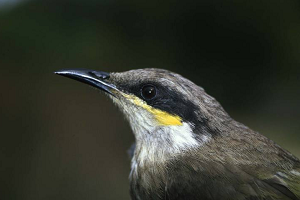Birds prove willing to cross the road for dining choices

Two local researchers spent four months watching birds cross a major thoroughfare to discover how many species of birds in Kings Park were able to cross the adjacent Thomas Road to reach nearby urban gardens.
The unique study revealed 61 per cent of species never crossed the six lanes of traffic in West Perth and those that stayed behind foraged on the insects in Kings Park that nearby gardens do not provide.
Edith Cowan University expert Dr Rob Davis says watching the birds' movements provided them with an opportunity to assess how well native birds have adapted to our urban landscape.
"We found that some species were quite at home in the more structured and manicured gardens that provide them with nectar from exotic plants, whereas most were more inclined to stay in Kings Park where native vegetation offers a diet rich in insects," Dr Davis says.
The researchers observed bird crossing frequency and height over Thomas Road and the occurrence of birds in the native bushland of Kings Park and nine adjacent urban gardens.
They then recorded their foraging behaviour in both the gardens and the bushland.
A total of 83 bird surveys were undertaken in the gardens and 50 surveys were conducted in Kings Park.
Of 32 species recorded, 17 were recorded in urban gardens and 30 were recorded in Kings Park.
"Only three species were classified as generalists and happy to forage in both habitats – the Red Wattlebird, introduced Rainbow Lorikeet and Brown Honeyeater," Dr Davis says.
"The Singing Dove, introduced Laughing Dove and the Singing Honeyeater were sighted more in gardens, having adapted well to the urban environment."
This study suggests major roads are a barrier to dispersal for some birds, such as the insectivores.
At the urban planning stage, Dr Davis recommends softening the transition from urban areas to native bushland to minimise habitat fragmentation and improve connectivity for native birds.
On a smaller scale, householders can contribute to preserving and growing a viable native bird population in our gardens.
"It is vital to keep gardens native, particularly with local plants that attract insects, such as waxes, wattles and eucalyptus," Dr Davis says.
"Local councils can guide people on what is best to plant in their area, Kings Park has a regular native plant sale and there is plenty of literature on the internet about how to attract birds to your garden with plants specific to your area."
Provided by Science Network WA


















